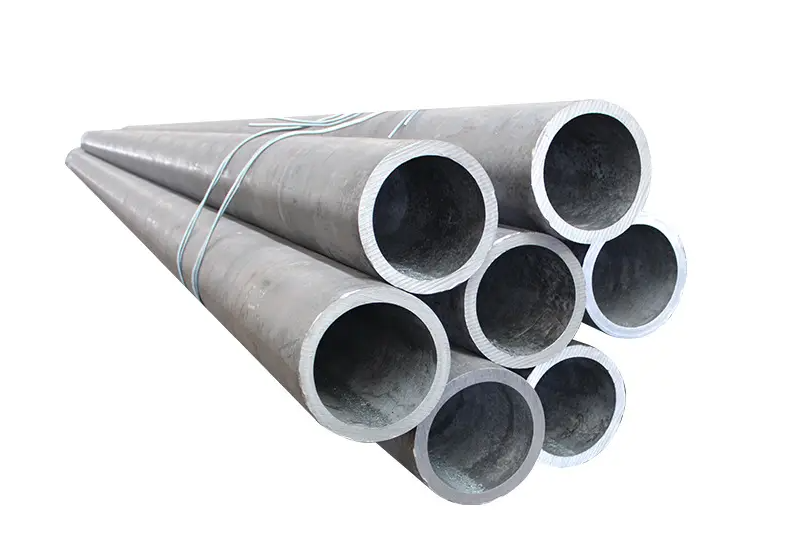ASTM A369 Alloy Steel Pipe

ASTM A369 Alloy Steel Pipe
Introduction
ASTM A369 is a standard specification for heavy-wall carbon and alloy steel pipe made from forged and bored billets. These pipes are designed for high-temperature and high-pressure applications, often used in boiler and pressure vessel construction. ASTM A369 pipes are ideal for environments where high strength and durability are essential.
Key Grades and Chemical Composition
ASTM A369 includes several grades, primarily classified into carbon steel and alloy steel. Here are some common grades:
- Carbon Steel Grades: FP1, FP2
- Alloy Steel Grades: FP11, FP12, FP22, FP91
Chemical Composition
Below are the chemical compositions for select ASTM A369 grades.
Carbon Steel Grades
Grade FP1
- Carbon (C): 0.10 – 0.20%
- Manganese (Mn): 0.30 – 0.80%
- Phosphorus (P): ≤ 0.035%
- Sulfur (S): ≤ 0.035%
- Silicon (Si): 0.10 – 0.50%
Grade FP2
- Carbon (C): 0.10 – 0.20%
- Manganese (Mn): 0.30 – 0.80%
- Phosphorus (P): ≤ 0.035%
- Sulfur (S): ≤ 0.035%
- Silicon (Si): 0.10 – 0.50%
Alloy Steel Grades
Grade FP11
- Carbon (C): 0.05 – 0.15%
- Manganese (Mn): 0.30 – 0.60%
- Phosphorus (P): ≤ 0.030%
- Sulfur (S): ≤ 0.030%
- Silicon (Si): 0.50 – 1.00%
- Chromium (Cr): 1.00 – 1.50%
- Molybdenum (Mo): 0.44 – 0.65%
Grade FP91
- Carbon (C): 0.08 – 0.12%
- Manganese (Mn): 0.30 – 0.60%
- Phosphorus (P): ≤ 0.020%
- Sulfur (S): ≤ 0.010%
- Silicon (Si): 0.20 – 0.50%
- Chromium (Cr): 8.00 – 9.50%
- Molybdenum (Mo): 0.85 – 1.05%
- Vanadium (V): 0.18 – 0.25%
- Nitrogen (N): 0.03 – 0.07%
- Niobium (Nb): 0.06 – 0.10%
Mechanical Properties
The mechanical properties of ASTM A369 pipes depend on the grade and heat treatment applied. Here are typical properties for some common grades:
Carbon Steel Grades
Grade FP1
- Tensile Strength: ≥ 415 MPa (60,000 psi)
- Yield Strength: ≥ 205 MPa (30,000 psi)
- Elongation: ≥ 30%
Grade FP2
- Tensile Strength: ≥ 415 MPa (60,000 psi)
- Yield Strength: ≥ 205 MPa (30,000 psi)
- Elongation: ≥ 30%
Alloy Steel Grades
Grade FP11
- Tensile Strength: ≥ 415 MPa (60,000 psi)
- Yield Strength: ≥ 205 MPa (30,000 psi)
- Elongation: ≥ 30%
Grade FP91
- Tensile Strength: ≥ 585 MPa (85,000 psi)
- Yield Strength: ≥ 415 MPa (60,000 psi)
- Elongation: ≥ 20%
Chemical Properties
| Grade | Carbon | Manganese | Phosphorus | Sulphur | Silicon | Chromium | Molybdenum | Others |
|---|---|---|---|---|---|---|---|---|
| FPA | 0.25 max | 0.27 – 0.93 | 0.035 max | 0.035 max | 0.10 min | … | … | … |
| FPB | 0.30 max | 0.29 – 1.06 | 0.035 max | 0.035 max | 0.10 min | … | … | … |
| FP1 | 0.10 – 0.20 | 0.30 – 0.80 | 0.025 max | 0.025 max | 0.10 – 0.50 | … | 0.44 – 0.65 | … |
| FP5 | 0.15 max | 0.30 – 0.60 | 0.025 | 0.025 | 0.50 max | 4.00 – 6.00 | 0.45 – 0.65 | … |
| FP9 | 0.15 max | 0.30 – 0.60 | 0.030 | 0.030 | 0.50 – 1.00 | 8.00 – 10.00 | 0.90 – 1.10 | … |
| FP11 | 0.05 – 0.15 | 0.30 – 0.60 | 0.025 | 0.025 | 0.50 – 1.00 | 1.00 – 1.50 | 0.44 – 0.65 | … |
| FP21 | 0.05 – 0.15 | 0.30 – 0.60 | 0.025 | 0.025 | 0.50 max | 2.65 – 3.35 | 0.80 – 1.06 | … |
| FP22 | 0.05 – 0.15 | 0.30 – 0.60 | 0.025 | 0.025 | 0.50 max | 1.90 – 2.60 | 0.87 – 1.13 | … |
| FP91 | 0.06 – 0.12 | 0.30 – 0.60 | 0.025 | 0.025 | 0.20 – 0.50 | 8.00 – 9.50 | 0.85 – 1.05 | Ni 0.40 max V 0.18–0.25 Cb 0.06–0.10 N 0.03–0.07 Al 0.02 max Ti 0.01 max Zr 0.01 max |
| FP92 | 0.07 – 0.13 | 0.30 – 0.60 | 0.020 | 0.010 | 0.50 max | 8.50 – 9.50 | 0.30 – 0.60 | W 1.50–2.00 V 0.15–0.25 Cb 0.04–0.09 N 0.030–0.070 Ni 0.40 max Al 0.02 max Ti 0.01 max Zr 0.01 max B 0.001–0.006 |
Mechanical Properties
| Grade | Tensile Strength, ksi [MPa] | Yield Strength, ksi [MPa] |
|---|---|---|
| FPA | 48 [330] | 30 [210] |
| FPB | 60 [415] | 35 [240] |
| FP1,FP2 | 55 [380] | 30 [210] |
| FP12 | 60 [415] | 32 [220] |
| FP91 | 85 [585] | 60 [415] |
| FP92 | 90 [620] | 64 [440] |
| All Others | 60 [415] | 30 [210] |
Manufacturing Process
Forging and Boring
ASTM A369 pipes are manufactured from forged and bored billets, which involve the following steps:
- Billet Heating: The steel billet is heated to a high temperature to become malleable.
- Forging: The heated billet is forged to form a rough pipe shape.
- Boring: The forged pipe is bored to achieve the required internal diameter.
- Machining: The pipe is machined to meet precise dimensions and surface finish requirements.
Heat Treatment
Heat treatment is crucial to achieve the required mechanical properties:
- Annealing: Heating the pipe to a high temperature followed by slow cooling to soften the material.
- Normalizing: Heating the pipe to a specific temperature and then air cooling to refine the grain structure.
- Quenching and Tempering: Heating followed by rapid cooling (quenching) and reheating to a lower temperature (tempering) to enhance toughness.
Testing Requirements
ASTM A369 specifies several tests to ensure pipe quality and performance:
- Tensile Test: Measures tensile strength, yield strength, and elongation.
- Hardness Test: Ensures the material meets specified hardness levels.
- Hydrostatic Test: Ensures the pipe can withstand internal pressure without leaking.
- Dimensional Inspection: Ensures the pipes meet specified dimensions and tolerances.
Applications
ASTM A369 pipes are used in high-temperature and high-pressure environments, including:
- Power Generation: Boiler and superheater tubes in power plants.
- Petrochemical Industry: High-pressure piping systems.
- Refineries: Process piping in high-temperature environments.
- Pressure Vessels: Components requiring high strength and durability.
Advantages and Limitations
Advantages
- High-Temperature Performance: Suitable for applications involving high temperatures.
- Strength: High mechanical strength suitable for demanding applications.
- Durability: Manufactured to withstand high pressure and stress.
- Precision: Forging and boring processes ensure precise dimensions.
Limitations
- Cost: Higher cost compared to welded pipes due to the forging process.
- Complex Manufacturing: Requires precise control over chemical composition and heat treatment.
- Availability: Specific grades and sizes may have longer lead times.
Conclusion
ASTM A369 heavy-wall alloy steel pipes are essential for applications requiring high strength, durability, and high-temperature stability. Their superior mechanical properties, combined with rigorous manufacturing and testing processes, ensure they meet the demanding requirements of various industries. Understanding the detailed specifications, grades, and applications of ASTM A369 pipes helps engineers and designers select the right materials for their projects, ensuring safety and efficiency in challenging environments.







